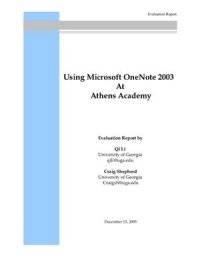
Ebook: Using Microsoft OneNote 2003 at Athens Academy
Author: Qi Li Shepherd Craig.
Evaluation Report. — University of Georgia, 2005. — 32 p.In order to improve students’ computer-related organizational skills and note-taking behaviors, Athens Academy is considering the adoption of Microsoft OneNote 2003 (hereafter called OneNote). Craig Shepherd and Qi Li, graduate students in Instructional Technology from the University of Georgia, evaluated the feasibility of OneNote for these purposes around three decisions:
Should Athens Academy adopt OneNote for teachers and students in grades 7-12?
If deemed appropriate for adoption, who should pay for the OneNote software?
If adopted, what training and support should be provided to teachers and students at Athens Academy?
To inform these decisions, we answered several questions using mixed methods: literature review, student surveys, faculty surveys, observations, student focus groups, and faculty focus groups, and a general literature review.
Students and faculty at Athens Academy show interest in using OneNote. OneNote can increase the effectiveness of taking, editing, distributing and organizing electronic school notes. OneNote can also alleviate the burden of taking classroom notes in multiple mediums (e.g., separate course notebooks, electronic notes written in Microsoft Word, mind maps, etc.) by organizing all notes within an electronic notebook of unlimited size. However, some faculty are unwilling to let students use laptops to take classroom notes because they are afraid students may use the laptops for inappropriate activities, they feel that their classrooms are inconducive to note taking, or they feel that classroom activities could not be captured electronically. OneNote, for example, does not easily support tables and mathematic or scientific symbols. In order to be an effective note taking program, these features are needed. Otherwise, students would have to continue taking notes in separate places (their laptop computer and a course notebook) while at Athens Academy.
Furthermore, because OneNote uses different formatting features than other Microsoft Office programs, compatibility issues arise between these applications. Lastly, while students and faculty quickly learned the basics of OneNote, additional training is needed if the application will be adopted by Athens Academy. Students also need additional training on the basics of computer file organization. Specifically, they need to learn how to name, save and retrieve files in a meaningful way.Contents:
Executive Summary.
Background.
Audiences.
Purpose.
Decisions and Questions.
Methods.
Sample and Procedures.
Limitations.
Results.
Student Perceptions of Organization.
Faculty Perceptions of Organization.
Usability of OneNote.
What OneNote features do students enjoy?
What OneNote features do students NOT enjoy?
What other issues related to OneNote should Athens Academy consider?
Faculty Experiences with OneNote.
Support/Training Needs of Faculty and Students.
Alternative/Supplementary Applications.
Recommendations.
Adopt Uniform Policies Towards Classroom Note-Taking.
Provide Additional Training About File Naming Conventions and Computer Search Tools.
Adopt Microsoft OneNote and Additional Desktop Search Software.
Provide basic OneNote Training to Students and Teachers.
References.
Appendix.
Faculty Survey.
Student Survey.
OneNote Experiences Questionnaire.
Faculty Interview Protocol.
Student Observation/Focus Group Protocol.
Should Athens Academy adopt OneNote for teachers and students in grades 7-12?
If deemed appropriate for adoption, who should pay for the OneNote software?
If adopted, what training and support should be provided to teachers and students at Athens Academy?
To inform these decisions, we answered several questions using mixed methods: literature review, student surveys, faculty surveys, observations, student focus groups, and faculty focus groups, and a general literature review.
Students and faculty at Athens Academy show interest in using OneNote. OneNote can increase the effectiveness of taking, editing, distributing and organizing electronic school notes. OneNote can also alleviate the burden of taking classroom notes in multiple mediums (e.g., separate course notebooks, electronic notes written in Microsoft Word, mind maps, etc.) by organizing all notes within an electronic notebook of unlimited size. However, some faculty are unwilling to let students use laptops to take classroom notes because they are afraid students may use the laptops for inappropriate activities, they feel that their classrooms are inconducive to note taking, or they feel that classroom activities could not be captured electronically. OneNote, for example, does not easily support tables and mathematic or scientific symbols. In order to be an effective note taking program, these features are needed. Otherwise, students would have to continue taking notes in separate places (their laptop computer and a course notebook) while at Athens Academy.
Furthermore, because OneNote uses different formatting features than other Microsoft Office programs, compatibility issues arise between these applications. Lastly, while students and faculty quickly learned the basics of OneNote, additional training is needed if the application will be adopted by Athens Academy. Students also need additional training on the basics of computer file organization. Specifically, they need to learn how to name, save and retrieve files in a meaningful way.Contents:
Executive Summary.
Background.
Audiences.
Purpose.
Decisions and Questions.
Methods.
Sample and Procedures.
Limitations.
Results.
Student Perceptions of Organization.
Faculty Perceptions of Organization.
Usability of OneNote.
What OneNote features do students enjoy?
What OneNote features do students NOT enjoy?
What other issues related to OneNote should Athens Academy consider?
Faculty Experiences with OneNote.
Support/Training Needs of Faculty and Students.
Alternative/Supplementary Applications.
Recommendations.
Adopt Uniform Policies Towards Classroom Note-Taking.
Provide Additional Training About File Naming Conventions and Computer Search Tools.
Adopt Microsoft OneNote and Additional Desktop Search Software.
Provide basic OneNote Training to Students and Teachers.
References.
Appendix.
Faculty Survey.
Student Survey.
OneNote Experiences Questionnaire.
Faculty Interview Protocol.
Student Observation/Focus Group Protocol.
Download the book Using Microsoft OneNote 2003 at Athens Academy for free or read online
Continue reading on any device:

Last viewed books
Related books
{related-news}
Comments (0)